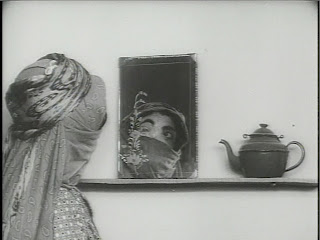The House Is Black/خانه سیاه است

A month or so ago I came upon a mini Iranian film festival on public television. There were two short films by Mohsen Makhmalbaf, The School That Was Blown Away (1996), and Images from the Qajar Dynasty (1992). But there was also a film that was something beautiful and terrible all at once, The House is Black (Khaneh siah ast in Farsi) created in 1962 by a woman I had not known of until now: a renowned Persian poet named Forough Farrokhzad.
Essentially, The House is Black is a documentary of a leper colony, an awful thing given beauty and humanity by Farrokhzad. In 1962 there were two drugs, Promin and Dapsone, used with limited and painful success to ease the disease, but a true treatment wasn’t developed until the 1970s. It is clear that even the earlier treatments did not make their way to this desolate colony in Iran. Still, with her unflinching shots of
 these afflicted people as they go about their daily lives, breathtaking is the scene of a woman applying eyeliner, and another combing her long beautiful hair—believing still in the beauty they lost, or might have once had, had they not caught the disease—Farrokhzad challenges us to not feel sorry for them even though they are clearly disfigured and indigent. All of the flickering black and white images are deeply affecting by themselves, but coupled with lines from the Koran, and Farrokhzad’s gorgeous poetry and this film is one that haunts. The House is Black is the only film ever made by Farrokhzad and is considered seminal to modern Iranian filmmaking.
these afflicted people as they go about their daily lives, breathtaking is the scene of a woman applying eyeliner, and another combing her long beautiful hair—believing still in the beauty they lost, or might have once had, had they not caught the disease—Farrokhzad challenges us to not feel sorry for them even though they are clearly disfigured and indigent. All of the flickering black and white images are deeply affecting by themselves, but coupled with lines from the Koran, and Farrokhzad’s gorgeous poetry and this film is one that haunts. The House is Black is the only film ever made by Farrokhzad and is considered seminal to modern Iranian filmmaking.Farrokhzad herself has an interesting story, having married against the wishes of her family, and divorced her husband (and being forced to hand over her only child, a son, to her husband’s family) to gain her independence. She went on to become a famed poet, but was considered a notorious woman for the lovers she took (even in pre Ayatollah Khomeini Iran, that sort of behavior in a woman was heavily discouraged). For more on Farrokhzad and samples of her poems go here to the Iran Chamber Society. I think they are quite wonderful. There is also Mirror of the Soul: The Forough Farrokhzad Trilogy (2002), a three part documentary on the poet directed by Nasser Saffarian that combines interviews with family and friends and footage of Farrokhzad shot by the famed Italian director Bernardo Bertolucci. You can rent this on netflix, or purchase it through the usual suspects.
As to her one and only film you can see it on youtube, but I would suggest renting it (it’s available on netflix and online at blockbuster) or ordering it, if you’d like it in your collection. The quality will likely be better (it’s sometimes hard to read the subtitles) and the DVD comes with all three films mentioned above.
For those who want a taste


Comments
You probably saw that Ishmael Reed's mom has a book out? Black Girl From Tannery Flats.
She began writing it when after many years she was no longer the primary or only caretaker for children, aging, debilitated parents, husband and all the other duties and obligations that women will fulfill instead of fulfilling their dreams. (I won't remark here about how so many men don't worry about this, and what women who charge ahead to fulfill their dreams and ambitions get called when they do that instead of doing caregiving.)
Ishmael Reed blogged about his mother's book on Counterpunch, which from what I understand, is another version of an essay he's already written about it in his most recent book of essays, ixing It Up, Taking On The Media Bullies. In any case, I want to read Ms. Reed's book, which deals with growing up in Tennessee and Buffalo, that other great U.S. migration, that of POC going north, and the reverse migration, north to south.
Of course Ishmael Reed was blessed with a marvelous mom.
Also you got an award, so to speak (it's just one of those memes, nothing important) -- http://foxessa-foxhome.blogspot.com/2009/02/premier-dardos-award-do-i-understand.html
Love, C.